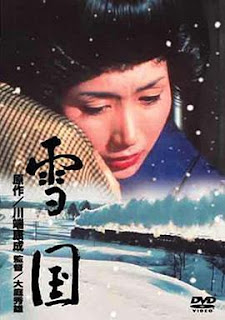42. Í-keng tih chhu-seh ah
Chhut e̍k-tiûⁿ liáu, koh ná kā yi se thâu-chang, ná kóng:
"Chit-ê gín-á nā khòaⁿ tio̍h gē-tòaⁿ tō kiò Komako Chan, bóe-im khiú koân-koân. Khòaⁿ tio̍h siàng a̍h-sī tô͘, lāi-té ū se Ji̍t-pún thâu-chang kòe ê, tō lóng kiò-sī ‘Komako Chan’. Góa chìn kah-ì gín-á, chìn liáu-kái in. Góa kóng: ‘Kimi Chan, lâi Komako Chan ê chhù sńg, hó bô?’"
Kóng liáu, Komako khiā khí-lâi, kiâⁿ kàu cháu-lông, tī chi̍t-tè tîn-í lán-lán chē lo̍h-lâi:
"Tokyo lâng kóaⁿ piāng-piāng. Lí khòaⁿ, í-keng tih chhu-seh ah."
Chit-ê pâng-keng tī khah koân ê só͘-chāi, ē-tàng khòaⁿ tio̍h lâm-pêng soaⁿ-kha ê chhu-seh tiûⁿ.
Shimamura mā ùi phōe-lô͘ oa̍t-thâu khòaⁿ kòe, soaⁿ-phiâⁿ seh hoe-hoe, ū gō͘-la̍k-ê lâng chhēng o͘ chhu-seh ho̍k, tī soaⁿ-kha hûiⁿ lih chhu-seh. Hia ê phiâⁿ-á hûiⁿ ê lêng iáu-bōe khàm seh, siâ-tō͘ mā bô kàu, si̍t-chāi bô hó-sńg.
"Ká-ná sī ha̍k-seng neh. Káⁿ sī lé-pài-ji̍t hoⁿh? Án-ne kám ū sáⁿ hó-sńg?"
"M̄-koh, in chhu ê chu-sè bē-bái neh." Komako ka-tī án-ne nauh:
"Thiaⁿ-kóng, gē-tòaⁿ mā tī chhu-seh tiûⁿ hām lâng-kheh phah-chio-ho͘, lâng-kheh ē tio̍h-kiaⁿ, kóng: ‘Oh, sī lí ah!’ In-ūi chhu-seh phôe-hu pha̍k o͘, lóng jīn bē-chhut ah. Àm-sî, iū-koh ū hòa-chong."
"Mā chhēng chhu-seh ho̍k, hoⁿh?"
"Chhēng seh-khò͘ lah. Ai-ah, thó-ià, thó-ià! Tī iàn-hōe tú-chiah sio-tú, in tō kóng, bîn-á-chài tī chhu-seh tiûⁿ koh sio-kìⁿ. Kin-nî góa m̄-thang khì chhu-seh. Chài-hōe lah. Lâi, Kimi, lán kiâⁿ. E-àm ē lo̍h-seh. Lo̍h-seh chêng hit-mê lóng chiok kôaⁿ ê."
Komako khí-sin lī-khui, Shimamura chē tī yi chē kòe ê tîn-í, khòaⁿ Komako khan Kimi ê sè chhiú, kiâⁿ chhu-seh tiûⁿ ē-té ê kiā-lō͘ túiⁿ khì.
Thiⁿ khí hûn, jia-iáⁿ ê soaⁿ hām chiò-ji̍t ê soaⁿ sio têng-tha̍h. Jia-iáⁿ a̍h-sī chiò-ji̍t sî-sî tih piàn, hiàn-chhut chheⁿ-léng ê kéng-tì. Bô gōa kú, chhu-seh tiûⁿ mā àm lo̍h-lâi. Ba̍k-chiu khòaⁿ thang-á-mûi ē-bīn, ta kiok-hoe lî-pa téng, ū ná kian-tàng ê sng-á-chhiu. Chhù-téng iûⁿ-seh ê chúi ùi sîn-chúi-kóng tih lo̍h ê siaⁿ bô chi̍t-sî thêng.
--
42. 已經 tih 趨雪 ah
出浴場了, koh ná kā 她梳頭鬃, ná 講:
"這个囡仔若看著藝旦 tō 叫 Komako Chan, 尾音搝懸懸. 看著相抑是圖, 內底有梳日本頭鬃髻 ê, tō 攏叫是 ‘Komako Chan’. 我晉佮意囡仔, 晉了解 in. 我講: ‘Kimi Chan, 來 Komako Chan ê 厝耍, 好無?’"
講了, Komako 徛起來, 行到走廊, tī 一塊籐椅懶懶坐落來:
"Tokyo 人趕 piāng-piāng. 你看, 已經 tih 趨雪 ah."
這个房間 tī 較懸 ê 所在, 會當看著南爿山跤 ê 趨雪場.
Shimamura mā ùi 被爐越頭看過, 山坪雪花花, 有五六个人穿烏趨雪服, tī 山跤 hûiⁿ lih 趨雪. Hia ê 坪仔 hûiⁿ ê 稜猶未崁雪, 斜度 mā 無夠, 實在無好耍.
"Ká-ná 是學生 neh. Káⁿ 是禮拜日 hoⁿh? Án-ne 敢有啥好耍?"
"毋過, in 趨 ê 姿勢袂䆀 neh." Komako 家治 án-ne nauh:
"聽講, 藝旦 mā tī 趨雪場和人客拍招呼, 人客會著驚, 講: ‘Oh, 是你 ah!’ 因為趨雪皮膚曝烏, 攏認袂出 ah. 暗時, 又閣有化妝."
"Mā 穿趨雪服, hoⁿh?"
"穿雪褲 lah. Ai-ah, 討厭, 討厭! Tī 宴會拄才相拄, in tō 講, 明仔載 tī 趨雪場 koh 相見. 今年我毋通去趨雪. 再會 lah. 來, Kimi, 咱行. 下暗會落雪. 落雪前彼暝攏足寒 ê."
Komako 起身離開, Shimamura 坐 tī 她坐過 ê 籐椅, 看 Komako 牽 Kimi ê 細手, 行趨雪場下底 ê 崎路 túiⁿ 去.
天起雲, jia 影 ê 山和照日 ê 山相重疊. Jia 影抑是照日時時 tih 變, 現出生冷 ê 景致. 無偌久, 趨雪場 mā 暗落來. 目睭看窗仔 mûi 下面, 焦菊花籬笆頂, 有 ná 堅凍 ê 霜仔鬚. 厝頂溶雪 ê 水 ùi 承水管滴落 ê 聲無一時停.
--
42.
Back from the bath, Komako was combing her hair. "Whenever the child sees a geisha, she calls out 'Komako' in that funny accent, and when she sees a picture of someone with her hair done in the old way, that's 'Komako' too. Children can tell when you like them. Come, Kimi. Let's go play at Komako's." She stood up to leave, then sat down lazily on the veranda. "Eager people from Tokyo already out skiing."
The room looked from high ground directly south over the ski runs at the base of the mountain.
Shimamura glanced up from the kotatsu. There were patches of snow on the mountain, and five or six figures in black ski clothes were moving about in the terraced fields. It seemed a trifle silly. The slope was a gentle one, and the walls between the fields were not yet covered with snow. "They look like students. Is today Sunday? Do you suppose that's fun?"
"They're good, though," Komako said, as if to herself. "Guests are always surprised when a gei sha says hello to them on the ski grounds. They don't recognize her for the snow-burn. At night the powder hides it."
"You wear ski clothes?"
She wore "mountain trousers," she said. "But what a nuisance the ski season is. It's all coming again. You see them in the evening at the inn, and they say they'll see you again the next day skiing. Maybe I should give up skiing this year. Good-by. Come along, Kimi. We'll have snow this evening. It's always cold the night before it snows."
Shimamura went out to the veranda. Komako was leading Kimi down the steep road below the ski grounds.
The sky was clouding over. Mountains still in the sunlight stood out against shadowed mountains. The play of light and shade changed from moment to moment, sketching a chilly landscape. Presently the ski grounds too were in shadow. Below the window Shimamura could see little needles of frost like ising-glass among the withered chrysanthemums, though water was still dripping from the snow on the roof.
--


No comments:
Post a Comment